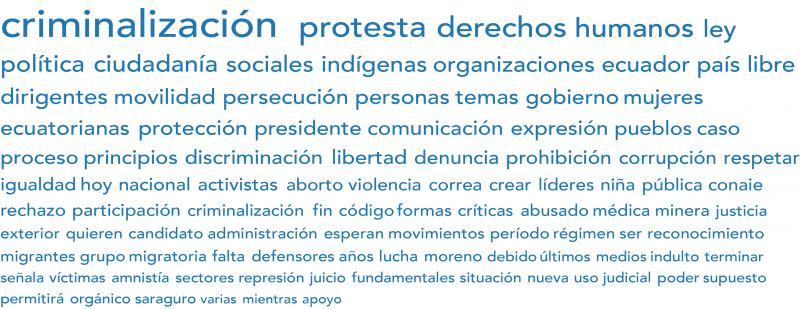The Reframed Stories Project asks people to respond to dominant themes and issues that appear in news coverage about their communities. These stories are reflections by people who are frequently represented by others in the media. Word clouds are created using the Media Cloud platform, a data analysis tool which examines a collection of media outlets over a specific period of time, allowing participants to analyze and discuss the preliminary insights into how they might be represented in the media. The project refrains from making conclusive pronouncements about the data, and instead is a starting point that creates space for discussion about how they can help shape their own media representation through digital media.
Marcelo Santillán is a member of the broadcast team of the weekly program “Descolonizar el Coco” on Wambra Radio in Quito, Ecuador. The following is a transcript of the video about Marcelo's analysis of the word cloud for the term, “criminalización” (criminalization of protest) as it relates to the Ecuadorian context.

Dominant words from articles published between January 2017 and April 2018 mentioning “criminalización” (141 articles) within 2 Media Cloud collections of Ecuador’s Spanish-language media outlets. (view larger image)
What about the word cloud drew your attention most?
Me sorprende que la criminalización se reduzca solamente a los procesos de violencia física del estado sobre la población, (especialmente) sobre poblaciones populares.”
I'm surprised that the term ‘criminalization’ is reduced to physical processes such as the physical violence by the State on the population, [especially] popular populations.
According to the word cloud, how has ‘criminalization’ been represented in the media?
La criminalización [de protesta] ha sido una forma de denunciar los procesos de represión, discriminación y cualquier forma de violencia física, legal y simbólica de parte del estado sobre la población y sobre las versiones populares.
Criminalization [of protest] has been one way of denouncing repression, discrimination, and any form of physical, legal, and symbolic violence by the State on the population and other popular groups.
How should ‘criminalization’ (of protest) be represented in the media?
Lo interesante de este análisis que se hizo sobre los medios es que (notamos) que se escribe muy poco sobre eso: en un año se han escrito 187* artículos en todos los medios de comunicación del país. Es interesante que desde un medio comunitario se podría abarcar este tema, no sólo desde la criminalización, entendida como procesos de violencia y de represión, sino entender también la criminalización desde otros procesos más de carácter simbólico, más de carácter de invisibilizar los procesos que se van dando en las luchas populares.
What is interesting about this media analysis is that in the course of a year, 187 articles* were written [about criminalization] in [this collection] of the country’s media. Very little is written about this. So it is interesting that the topic could be written about by a community media outlet that could d encompass the topic not only from an understanding of criminalization, as violence and repression, but also seen from a symbolic nature that can make the popular struggles invisible.
*note: the actual number of articles was 141 according to Media Cloud
What words should a word cloud for ‘criminalization’ (of protest) have?
Los procesos de resistencia no se visibilizan con la criminalización. Es la historia que tienen muchos de otros aspectos, sobre todo políticos, las luchas de los pueblos, las luchas de los centros populares deberían visibilizarse con este en este tema y no se los está topando.
The processes of resistance are not visible with the [word] criminalization. It's the story that has many other aspects, especially political, the peoples’ struggle, the struggles of the popular centers should all be visible within this subject and we are not running across this.
This is part of a Rising Frames series developed in close collaboration with the organization El Churo based in Quito, Ecuador. They organized a workshop held on April 21, 2018 in Quito that brought together representatives from various collectives and groups to examine how they or issues they care about are represented in a collection of Ecuadorian media and created stories in response to that representation.
Support our work
Since Rising Voices launched in 2007, we’ve supported nearly 100 underrepresented communities through training, mentoring, microgrants and connections with peer networks. Our support has helped these groups develop bottom-up approaches to using technology and the internet to meet their needs and enhance their lives.
Please consider making a donation to help us continue this work.



